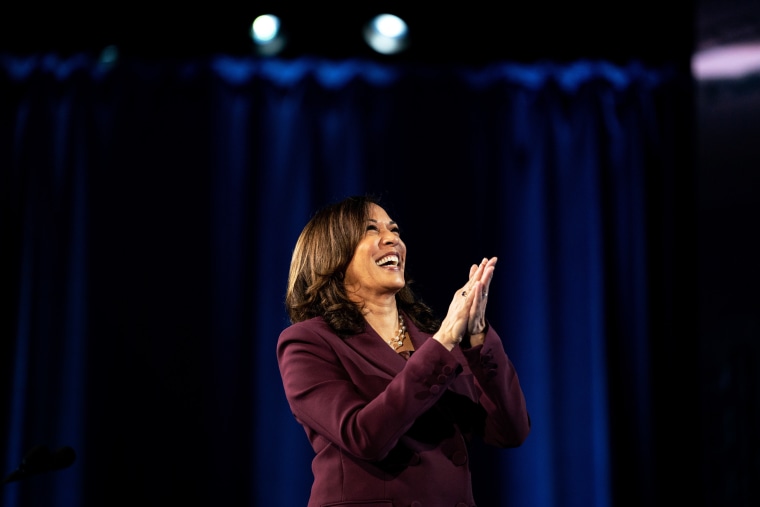With Joe Biden now projected to win the presidency, his running mate, Sen. Kamala Harris, also solidified her place in history Saturday by becoming the first woman, the first Black American and the first South Asian American elected vice president in U.S. history.
Harris’ political career has included many barrier-breaking moments, such as serving as California's first Black female attorney general and being the second Black woman in history to be elected to the U.S. Senate.
Harris, 56, the only Black woman currently in the Senate, was elected in 2016 after serving as California’s attorney general and, before that, as the San Francisco district attorney. The child of Jamaican and Indian immigrants, the native of Oakland, California, has said she was inspired to attend law school after attending civil rights protests with her parents.
Before Harris made history in the ivory halls of Congress and on the Democratic presidential ticket, her sharp debate skills and understanding of her multiracial heritage were honed at Howard University, one of the most prestigious historically Black colleges in the country.
Harris, a member of Alpha Kappa Alpha, the historically Black sorority she joined while at Howard, will also be the first vice president from a historically Black Greek-letter organization.
Harris’ mother, Shyamala Gopalan, who immigrated to the United States at the age of 19 to pursue a doctorate in nutrition and endocrinology at the University of California, Berkeley, had an immense impact on Harris and her sister, Maya. The senator has spoken about how Gopalan, a civil rights activist, was a role model for her despite the challenges she faced as an immigrant and later as a single mother, forging a life in the United States.
Gopalan met Harris’ father, Donald, while participating in civil rights protests. They eventually divorced, with her raising the children on her own. Gopalan was cognizant that most people would see her children as Black and was “determined to make sure we would grow into confident, proud Black women,” Harris wrote in her autobiography, “The Truths We Hold.” However, Gopalan also made efforts to nurture her children’s Indian heritage.
Picking Harris also provided the ticket with generational diversity. Biden, who will turn 78 later this month, is the oldest president-elect in U.S. history.
The Democratic Party and the campaign argued that the ticket could bring together a racially diverse coalition of voters to take back the White House to rescue the economy and protect American lives as the coronavirus pandemic shows no signs of slowing down. The ticket also promised to heal racial and partisan divides.
Harris, who was also a 2020 presidential hopeful, garnered attention early in the primary when she clashed with Biden over racial issues during the first Democratic debate. Biden later said the clash was surprising because, as attorney general, Harris worked closely with her Delaware counterpart, Biden’s son Beau Biden.
But it was no shock when Biden tapped her to be his running mate. Political observers have noted that Harris' place on the ticket resonated with voters of color, and was also indicative of the power and influence Black women have as a voting bloc in the country and particularly in the Democratic Party.
Harris’ record as a prosecutor, especially on issues such as marijuana convictions and truancy, was seen as both an asset and a liability both during her own unsuccessful run for the Democratic nomination and when Biden tapped her to be his running mate. A prosecutor’s polish was helpful as she campaigned and participated in debates, but her record was a source of concern to younger, more progressive voters, particularly young Black voters.
During both her primary run and as the vice presidential nominee, Harris touched on the legacy of Black women who paved the way for her. She gave her acceptance speech during the Democratic National Convention around the time of the 100th anniversary of the 19th Amendment, which gave women the right to vote. Harris noted, however, that right came much later for most Black women, who helped secure that victory but were still barred from voting.
Download the NBC News app for breaking news and politics
Black and female lawmakers Saturday noted the trailblazing moment.
"4 years ago, @KamalaHarris became the first South Asian American woman ever elected to the Senate," Rep. Pramila Jayapal, D-Wash., tweeted . "Now, she's the Vice President-Elect of the United States!! We've not only shattered ceilings, but we've constructed a different path for millions as they imagine their own futures."
"Now more than ever, our country’s leadership is more reflective of our diverse and dynamic country," said Rep. Jim Clyburn, D-S.C., whose endorsement was widely considered to have been instrumental to Biden's securing the Democratic nomination.
"I feel like our ancestors are rejoicing," Sen. Cory Booker, D-N.J., tweeted. "For the first time, a Black and South Asian woman has been elected Vice President of the United States. My sister has made history and blazed a trail for future generations to follow. We love you, @KamalaHarris."
Andra Gillespie, an associate professor of political science at Emory University, told NBC News in a phone interview that Harris' election shows Black women taking their "rightful places of leadership within the party, given how important they are to Democratic victories around the country."
"I think that's actually really important because it is centering women of color in the history and story of women in the United States in ways that they haven't been before," she said.
Gillespie added, "Now it becomes a question of, who else does she open doors for?"


